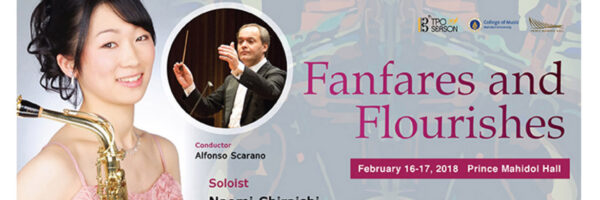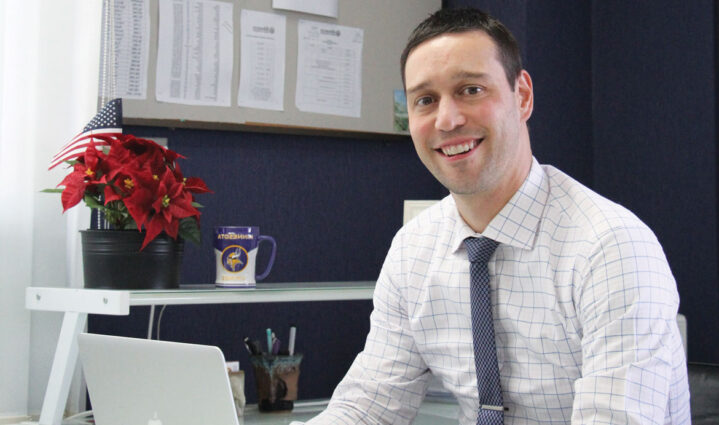
Meet the Headmaster of ASB
Expat Life sat down with Ryan Barnick the headmaster of the American School in Bangkok Green Valley Campus just before the end of the year and found out how he arrived in Bangkok and what was his journey.
Where are you from?
I grew up in a small farming town of 700 people (Alden) in rural southern Minnesota in the USA. I am proud to come from a community where everyone knows and supports each other. I believe that because of my upbringing I have a keen understanding and value for the importance of creating, building and fostering relationships.
What attracted you to teaching? How has your background influenced you as an educator?
While studying abroad in Samoa during my senior year of college, I volunteered for a few weeks in a village school, it was then that I decided I did not want to work in the finance industry my whole life, but rather I wanted to work with children. So upon successfully completing my first Degree a Bachelor of Arts in Financial Economics, I then quickly changed direction and pursued a Master’s Degree in Education and entered the teaching profession. As a child I enjoyed the balance of athletics and academics, thus deciding to work in a school setting for my career was an easy one for me.
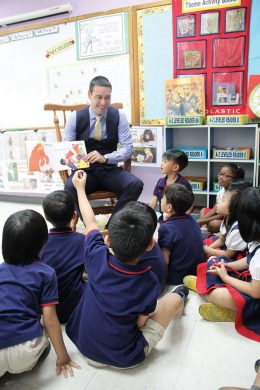
Education is about second chances and do overs, mastery of learning, reflection and growth.
At which schools were you before ASB and in what capacity?
I taught special education in an urban setting at the elementary and middle school level for eight years, and one year as an administrator in Minneapolis Public Schools in Minnesota.
When did you first become a headmaster?
In 2013, I became the assistant principal of ASB. In 2014, I became the principal of our Green Valley Campus.
What do you consider your greatest success in schools before coming to ASB?
In Minnesota, I worked in very diverse schools serving students and families that faced profound social and economic difficulties. All things considered, I believe mygreatest success in education prior to ASB was increasing student attendance through community and school engagement. When you are deeply involved with families in an urban school setting, there are many variables to consider to get students to school. For example, many of the children I worked with come from families with parents that themselves did not finish high school, or the student is the caretaker of their siblings due to their mother or father being incarcerated.
Additionally, many of my students were homeless, and would come to school inadequately dressed and or hungry. Ultimately, when you work with students and families in critical need, your job becomes about more than providing a traditional education within the walls of a classroom. I really felt I had made a difference in the inner city as I was able to connect emotionally with students. I became a role model, particularly for the male students who were desperately seeking out a positive male figure in their lives to look up to.
What was the most challenging teaching/administration situation you faced before coming to ASB?
Before coming to ASB, my biggest challenges were increasing student attendance and supporting students social and economic needs to enable them to fulfil their full potential at school.
Do you have a personal educational philosophy?
My personal educational philosophy is pretty simple: All students can and will learn if we surround them with the right people. Every student can not only succeed, but they can unquestionably excel when the learning environment is supportive and we believe in their success. I believe it is important that we all work together collaboratively in education to involve as many stakeholders as possible when making educational policy decisions for our children.
What are some of the current trends in international education?
Education today is about building a growth mindset within our students. Students need to know that failing is okay and that through failure we learn, grow, build resilience and eventually succeed. Education is about second chances and do overs, mastery of learning, reflection and growth.
As educators, we need to provide opportunities in our classrooms and schools for innovation, strategic and extended thinking and synthesising complex information. By changing the ways we assess student learning, and the strategies we use to teach, we can better prepare our students for the world which they will one day encounter.
How do you adapt them to ASB?
All teachers at ASB are engaged in a year long Professional Learning Community (PLCs) where they work collaboratively on a mini action research project. The PLC process allows teachers to continue to develop their professional practices and improve student learning. The topics of our PLCs range from educational neuroscience to developing curiosity in students. Our PLC topics support the school’s mission and goals and are chosen by teachers. This process ensures the continued growth and development of our teachers and our school to meet the demands of 21st century learners.
What are the benefits (from your point of view) of an international school education?
I believe that an international education opens up our children’s minds and viewpoints and teachers them that a healthy world is about all of our collective efforts. Children learn many perspectives, tolerances and through experiences are better prepared to contribute globally.
What are the challenges (eg 3rd culture kids syndrome) and how do you address them?
I believe one of the most challenging aspect of being a “3rd culture kid” is identifying socially who you are, what you represent (what is “home”?), what is important to you, values,etc. I often hear that a child (my own included) “misses” A, B,
and C from home, yet fail to acknowledge the benefits they have gained from living in Thailand as a 3rd culture kid. That
said, I am quick to remind them of all that they have gained and learned as a 3rd culture kid and they always agree 100%.
What attracted you to ASB?
I believe in the American educational system and what it has to offer the student. Our curriculum provides specific learning standards in Science, Math and Language Arts critical to future success in western colleges and universities. The American School Bangkok has adopted these standards, creating an optimal learning focus for students. My own children (age 5 and 7) attend ASB and I am confident in the quality of their education and that it meets the standards of public schools in the US. Of course, like many other educators in Bangkok, the culture, food, etc., of Thailand intrigued me as well.
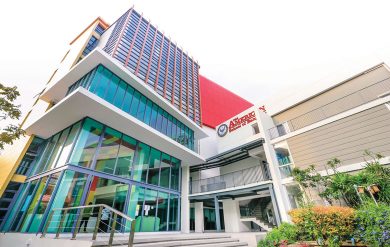
How long have you been at ASB?
This is my fifth year at ASB having previously completed 8 years in education in the Minnesota in the USA.
What is ASB’s philosophy? Does it compliment yours?
The philosophy of the school centres on promoting excellence in children and youth through laying the foundation by building positive healthy relationships, focusing on literacy, the creative arts and developing global citizens. I believe strongly in the importance of healthy positive relationships in order to best engage students in their learning.
What are some of the school’s greatest accomplishments? What are some of the biggest challenges this school faces?
- We are the first school in Thailand to offer the Advanced Placement Capstone Diploma. Our advanced students have an opportunity to earn an AP Capstone Diploma by completing four Advanced Placement classes, in addition to a research based class and capstone seminar class.
- We also offer a wide array of Advanced Placement classes, in which students can earn college credit while attending class at ASB. Many of our students take advantage of this, especially if they are planning to attend University in the USA.
- We are one of the (if not the most) preeminent schools in all of Asia to integrate Mindfulness Education into our curriculum. Our assistant director has been vital in the development of mindfulness education at ASB, attending various trainings around the world and then bringing that information back to ASB. “Mindfulness Education” at ASB is simply us teaching students how to regulate and understand their emotional wellbeing.
- One of the biggest challenges we face, like many other schools, is teacher retention. I am proud to say that the teacher retention rate has decreased dramatically at ASB Green Valley.
- Another challenge we face is ensuring that we are meeting the individual needs of each and every student. Though we consider diversity to be one of our biggest strengths as a student body, with that also comes challenges being that our students come from 39 different countries around the world. As such, we also an expansive English Language Learner (ELL) department and Learning Support department to ensure all students needs are being met.
Do you try to meld American, British and IB standards? Or is ASB strictly IB or strictly A levels? Why and what are the benefits?
At ASB we stay true to the American education curriculum. Kindergarten through to Grade 12 we offer the American Common Core Curriculum and Next Generation Science Standards (NGSS) for science.
How is technology used to support teaching and learning?
We offer technology courses for every student in our school, starting with our Early Years class (age 2) all the way up to advanced tech classes for our high school classes. In the past few years, we have heavily integrated coding into our technology classes starting with our elementary students, and now are providing students with opportunities to apply what they have learned in these courses in our robotics clubs.
This year, our students will compete locally in a robotics competition, and next year we will expand on that and compete at the international level. In regards to supporting teaching and learning, our technology team works with our teachers to integrate technology into their lessons. My opinion is that technology can be as much of a distraction as it can be a positive in the classroom. If a teacher understands how to use technology in the classroom to “enhance” their lessons as opposed to simply “using technology”, students benefit greatly. Otherwise, as experienced educators have learned, it can be more of a distraction.
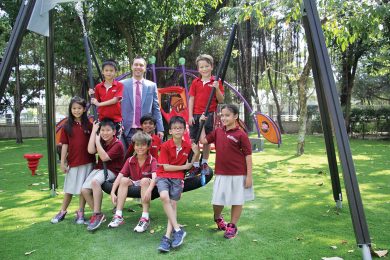
What extracurricular opportunities (sports, clubs, community service, competitions) are available for students?
At ASB, we are proud to say that we educate the whole child as we offer a plethora of both athletic and academic extracurricular opportunities. For athletics, we compete as a member of the Bangkok International School Athletic
Conference (BISAC) in many sports for both boys and girls. In addition to BISAC, some of our teams compete in international events overseas. For academics, we offer students opportunities to participate in Model United Nations
(MUN), World Scholars Cup and the Tournament of the Minds, to mention a few.
What is the homework expectation? What do you say to people that say homework is unnecessary?
This is an interesting topic and always a popular discussion among international educators. For me, I am not a firm believer in the “more is better” theory in that I believe homework should be given simply for ‘practice’. In the international education world, there is a polarising dichotomy that is present when it comes to “homework”; in that culture plays a role as to what is “best”. For example, many of our students that were raised in Asia expect more homework, and their parents often request that additional assignments to work on at home. In contrast, many of our families that were raised in the USA or UK simply don’t value homework as much.
Of course, this is not true for every family, but generally speaking this is the feedback I hear from parents. This all said, we certainly do require ASB students to complete homework at home, but have worked with our families to find the right balance as to how much time students should be spending on homework each night. For our older students, a large part of the “homework debate” is simply preparing them for university life. No doubt, when our students attend university/college they will endure long nights of studying and homework, thus it is our responsibility to help them prepare and understand the expectations when it comes to commitment level.
Student Support
Are counsellors available to help students make important decisions about classes and about university choices?
We have a full-time Academic Counsellor who works with our students to apply to universities, find scholarships and advise students regarding course selections regarding specific career options.
How do you help children that find the curriculum challenging or have social or emotional problems?
The school employs a full-time Social Emotional Counsellor who works with our students from nursery through to grade 12. We also have Mindfulness specialists who provide classroom instruction and workshops for both students, faculty and parents.
Does the school have a tutoring programmes so students can get extra academic help if they need it?
Yes, tutoring is offered everyday after school for allsubjects should parents wish to enrol their children.
What strategies are used to teach students who are not fluent in English?
We do have an expansive ELL department for students at all grade levels. This team primarily focuses on the students individual needs, creating a programme for each student based on their current level of English proficiency. Our ELL teachers support ELL students in the mainstream classroom and also teach English directly in their own classroom. Our goal for our ELL students is to ultimately exit them from ELL Services to attend class without support from our ELL team. ASB has a wonderful history of success with our ELL students from an academic standpoint. In fact, one of our previous students started 9th grade as an ELL student and graduated as our school valedictorian.
Where do students go after they graduate? How many attend four year college? Are graduates prepared for college? Do you have business links, ties to university, information about how to get to the next stage of their lives?
Most of our students enter into universities all over the world, however, the majority of our students further their education in the USA, Canada or the United Kingdom. I believe ASB properly prepares our students for university. One of the perks, I would say, as a principal is connecting with previous students when they return back to ASB after their first semester/year to visit. It is telling in that our students consider ASB to be their family – thus their excitement glowing when they return to discuss their new life beyond ASB. Our academic counsellor, Ms Meca, does an absolute phenomenal job in assisting our students obtain scholarships at universities all over the world.
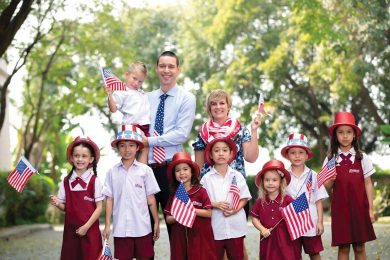
Logistics
What are maximum class numbers? What is the teacher/student ratio?
Our school teacher to student ratio is 1-10.
How do you deal with bullying? Discipline?
We use different models to support our students depending on the situation. We practice a restorative justice model where the focus is not on punishment but on learning and remorse to support the victim and and repair the harm done by the offender. We also implement a restitution model and engage the Social Emotional counsellor and Mindfulness specialist with the student and teach students the skills required to self regulate their emotions.
Teacher recruitment?
Each year in late January I travel to North America to interview and recruit licensed international teachers. I primarily hire at the University of Northern Iowa (UNI) Overseas Recruiting Fair in Cedar Falls, Iowa (USA) and The Teachers Overseas Recruiting Fair (TORF) at Queen’s University in Kingston, Ontario (Canada).
Do you have busses to pick up and deliver students?
We do offer transportation services in which students can be picked up either at their door or at a preassigned stop, depending on their age and location.
When can people arrange tours?
Tours can generally take place any time from 7:30am – 4pm at our Green Valley campus. If families are interested they can arrange and tour with Mr Martin by simply calling and scheduling.
When is ‘enrolment season’?
Our first day of school each year in the first week of August, thus is it best if a student enrols prior to the school year starting. That said, students can and do enrol throughout the school year, it just depends on the student’s individual situation.



